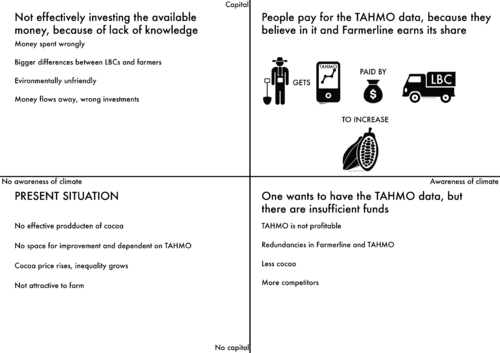Goals
-
Transmit a general forecast over the radio
-
Create awareness about climate among farmers
-
Gather information about the farmers’ needs
-
Find a financer for the project
Phase 1
Doing research about the TAHMO project. Understand the current situation in Ghana and see the urge of this matter.Speak with all the stakeholders involved in the project as far as possible. Make analyses about the different aspects that affect the project. Examples are cultural background, technical and cocoa analyses.
These tasks lead to a business plan to be carried out in Ghana.
Phase 2
In Ghana, the farmers, LBCs, GMet and governmental officials should be interviewed. There should be negotiated with them and they should be convinced that this business model is feasible for Farmerline, but more importantly, also for them.
Phase 3
After having spoken with the relevant stakeholder and convincing them to participate the project, arrangements should be made. Concrete plans where tasks are carried out.
Phase 4
This phase is evaluation. The pending tasks should be checked if they are accomplished. Achievements should be measured and follow-up tasks should be given.
Phase 5
In the last phase, the project is being transferred to Farmerline. Farmerline must be able to carry on with the project without external help. This is a very important phase, as this makes or breaks the project in the long run and creates continuity.
Deliverables
The report shows the progress made during the project in Ghana. It shows what is parts are feasible and which are not or less. The report can be used as a manual or handles to carry on with the project. New tasks can be defined and carried out, based on the findings explained in the report.
Scope
Our main focus will not be on the other activities Farmerline is offering at the moment. Insurances, loans and fertilisers will not be in our main scope. However, if we encounter problems in our goals, might broaden our horizon on the go to help where needed.
During the stay we will learn if there is demand for weather data among farmers, if not that would be a good thing to start with. And as last we hope to get an insight of the farmer culture in Ghana. Not only will there be worked on the project in the office. Also we will have direct interaction with the farmers and partners. We want to know everything the farmers know about weather and harvest and how those two affect each other. And how we could help them with that possible problem. Also we will interview the farmers, so we could try to understand them more, to develop the Farmer Forcast and to execute a market research.
Phase 1 is the orientation phase. It is done in The Netherlands as preparation for the trip to Ghana.
Phase 2 will start when arrived in Ghana. In the first few weeks, everybody’s opinion is relevant and should be taken into account.
Phase 3 will flow out from the previous one. This will take most time.
Phase 4 will take place in the last month of the project in Ghana. Progress is measured and final adjustments are made.
Phase 5 is an extension of phase 4. New people should take over the current tasks. Farmerline plays an essential role in making this a success.
Budget
In this project, the budget is not really relevant. Of course there will be made expenses. However, these are unknown at the moment. There should be money available to pay for the weather forecast on the radio and to maintain the weather stations. The data itself is digital, so that will not have significant costs.
Projectteam
During our stay in Ghana for 3 months, we have weekends off and Christmas holidays. During that period of time we will not focus on the project.
While working at the project on location everybody needs to take a certain institution he/she is responsible for. For example, one of us takes the responsibility to keep contact with the LBCs, the other with the farmers and the last one with the radio stations. All these responsibilities will be divided among the team members at location. This is to be as specific as possible. Not to forget, we are a team, if some of us is struggling to communicate with one of the institutions he or she is responsible for. This needs to be discussed with the other team members to solve this problem. At the end there will be a final report and a presentation. We all will be responsible for that.
We expect to communicate with the Farmerline crew, and have good communication with each other. We expect to have a good time. On the 5th of December we will together celebrate Sinterklaas.
Risks
In order to know the potential risks, a risk-cross is created. This risk-cross contains two axes, one with capital and the other one with awareness of climate. The upper right corner shows the desired situation, this cross shows the possible risk if there is a lack of capital of awareness of climate.
